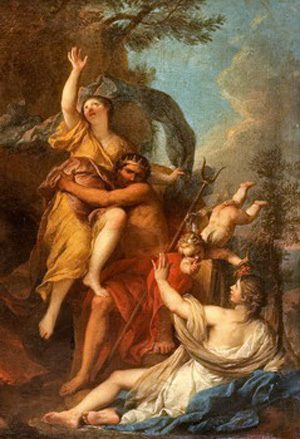Persephone 399
 Persephone, also called Kore (“Maiden”) was the daughter of Zeus and Demeter, a vegetation goddess associated with spring and the changing of the seasons. One day while walking in the fields she was abducted by her uncle Hades, and carried off to the underworld, where he made her his Queen. Demeter had no idea where her daughter had gone, and roamed the earth searching for her. At this time she neglected her duties of providing fruitfulness; crops withered, animals and humans died, all became waste while Demeter’s search continued.
Persephone, also called Kore (“Maiden”) was the daughter of Zeus and Demeter, a vegetation goddess associated with spring and the changing of the seasons. One day while walking in the fields she was abducted by her uncle Hades, and carried off to the underworld, where he made her his Queen. Demeter had no idea where her daughter had gone, and roamed the earth searching for her. At this time she neglected her duties of providing fruitfulness; crops withered, animals and humans died, all became waste while Demeter’s search continued.
At last Hekate, who had overheard the abduction, told Demeter where her daughter was, and she appealed to Zeus for Persephone’s return. This Zeus requested, but Hades refused, and faced with the prospect of the extinction of life on earth if Demeter continued to neglect her duties, Zeus ruled that Persephone could return, provided she had eaten none of the food of the dead.
Disconsolate at her enforced sojourn in the underworld, Persephone had in fact refused all nourishment, but one day while waking in the gardens, she had plucked a pomegranate and eaten six seeds. This act was witnessed by Hades’ gardener, Askalaphus, and he testified against her. Zeus determined that Persephone could be reunited with her mother, but for six months of the year, she would have to return to her husband. Demeter allowed life to renew on the earth, but withdraws her sustenance annually when her daughter departs for the underworld. Thus were the seasons created. With her mother Demeter, Persephone became a central figure in the Eleusinian Mysteries, an ancient cult promising benefits in the afterlife, whose initiates included a virtual Who’s Who of the Hellenistic world.
The relationship between Persephone and Hades remained strained, as exemplified in the story of her affair with Adonis. Adonis was himself the product of divine intervention; his mother Smyrna, daughter of the king of Assyria, was tricked into conceiving him, and when her father came after her to kill her and restore the family honor, the gods mercifully turned her into a myrrh tree. Nine months later, Adonis was born from the tree, a youth so beautiful that even Aphrodite, the goddess of love herself, became infatuated with him. But Artemis, goddess of the hunt, was so jealous of his hunting skills that she sent a wild boar after him, and Adonis was killed, descending to the underworld, where Aphrodite asked Persephone to keep a close eye on him. This the Queen of the Underworld surely did, to the extent that she herself fell in love with him, and refused to yield him up when Aphrodite asked. The resulting dispute between the rival goddesses was mediated by Zeus, who divided the year into thirds, ruling that Adonis must spend one third of the year with Persephone, one third with Aphrodite, and could spend the final third as he wished. Adonis chose to spend it with the goddess of love. This was another story used to explain the seasons.
Astrologically, Persephone represents separation, forcible or otherwise, as well as separation anxiety; rape or abduction; unexplained disappearance; disputes over love; and critical life passages, as birth, maturation, marriage, separation, divorce, or widowhood, and death.

2 Trackbacks
[…] 1) Alex Miller: Persephone 399 2) Martha Lang-Wescott: Basic Resources 3) Kirsti Melto: New Moon in Aries – April 12, […]
[…] 1) Amable: (32) Pomona 2) Mark Andrew Holmes: Fides 3) Alex Miller: Persephone 399 4) Martha Lang-Wescott: Basic Resources 5) Kirsti Melto: New Moon in Aries – April 12, 2021 […]